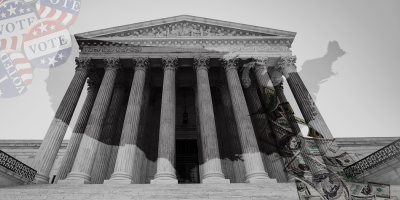The Political Accountability and Transparency Act (PATA), H.R. 679, a bipartisan bill introduced by U.S. Representatives Kathleen Rice (D-NY), Mike Gallagher (R-WI), and Derek Kilmer (D-WA), addresses the abuses of campaign finance law that have become increasingly common in federal elections. Campaign Legal Center’s new issue brief describes how PATA would attend to pressing democracy issues like single-candidate super PACs and digital disclosure loopholes.
If passed, the bipartisan bill would address some of the major challenges in campaign finance law, helping to limit the influence of wealthy donors who bankroll super PACs and ensuring that every voter’s voice is heard, not just a wealthy few.
As CLC describes in its issue brief, PATA tightens restrictions on coordination between super PACs and candidates, requires greater transparency about who is financing political advertisements, and closes loopholes that have allowed candidates to appropriate political contributions for personal use.
In other words, PATA would help federal law keep up with developments in the ways modern campaigns are actually run in a post-Citizens United world. The bill focuses on addressing the following three key issues:
1. Limit Coordination between Super PACs and Candidates
PATA would limit the ability of super PACs or dark money groups to work closely with the candidates they support by closing loopholes and clarifying the types of conduct and spending that establish illegal coordination.
2. Bolster Campaign Finance Disclosure
PATA would require advertisements to disclose who the biggest donors are to the organization paying for the advertisement, and ensure that digital ads are subject to the same disclosure requirements as broadcast ads by expanding the definition of “electioneering communication” to include online ads.
3. Limit the Personal Use of Political Funds
Finally, PATA would clarify that officeholders’ leadership PACs cannot be used to pay for personal expenses. As CLC has documented, although leadership PACs are supposed to be used to support other candidates, only a minority of leadership PAC spending goes towards contributions; instead, leadership PAC funds are routinely used for luxury travel, expensive meals, or other potentially personal expenses. PATA seeks to change that.
Learn more in the issue brief: Political Accountability and Transparency Act.

